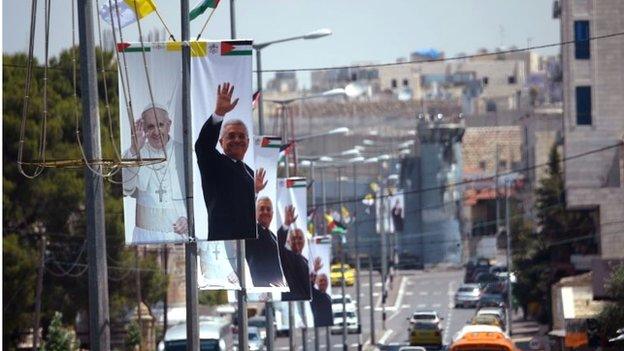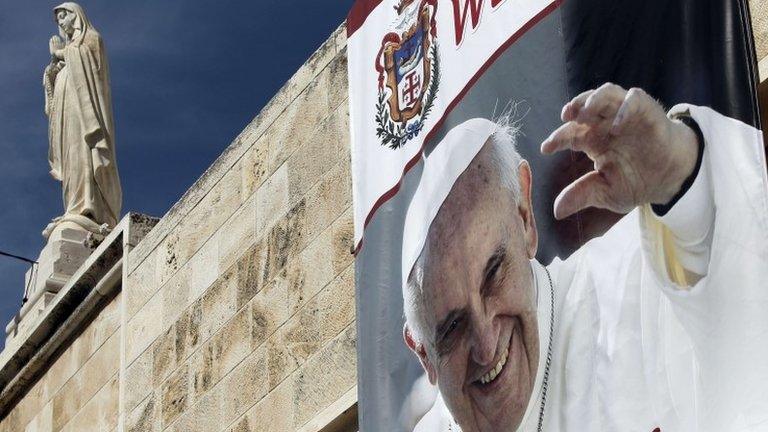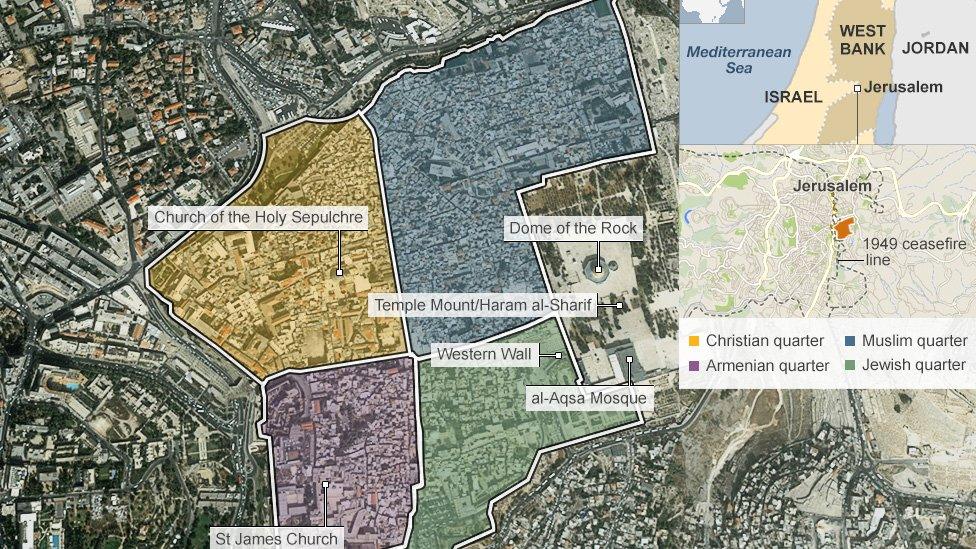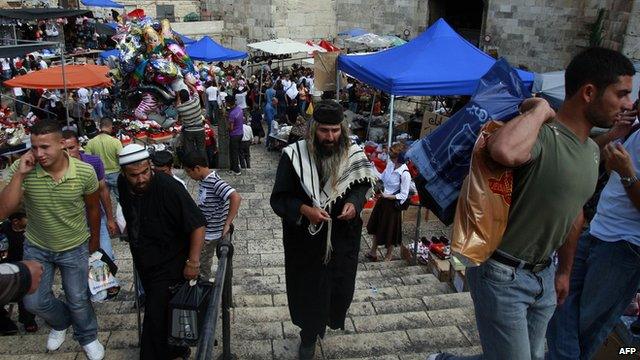Thorny issues await Pope in Holy Land
- Published

The Pope's visit has been carefully choreographed to avoid political pitfalls
Last year about 1.8 million tourists from around the world came to Bethlehem, most heading to the Church of the Nativity.
In some ways, Pope Francis is no different from them.
His visit to the Holy Land is first and foremost a pilgrimage and he wants to pray on the spot where it is believed that Jesus was born.
However local Christians, particularly the Roman Catholic minority, are also looking to the pontiff for support.
He is arriving just after the latest round of peace talks between the Palestinians and Israel broke down.
"He should bring a message for peace: peace to the whole world and especially for the Holy Land. We are living in a very bad situation," says Rania Bandak, manager of Bethlehem's Peace Centre.
"We are not able to move freely to all parts of Palestine. Bethlehem is surrounded by Jewish settlements and the high wall that cuts us off from Jerusalem."
"The Pope's message should be that he wants us to stay in this land," adds souvenir shop owner, Rony Tabash. "We are the living stones of the Church."
Barrier fear
Eight thousand Palestinian Christians have been allocated spaces in Manger Square where the Pope will hold an open-air Mass.
Afterwards he will have lunch at the Casanova Restaurant with a hand-picked group who will highlight how their lives are affected by the conflict with Israel.
Maha Saca: "I'm so lucky to be making the Pope's scarf"
One issue that is sure to come up is the barrier that Israel is continuing to build in and around the occupied West Bank. Israel says its barrier is needed for security reasons but the Palestinians see it as a land grab.
Israel's Supreme Court has delayed its decision on a controversial section that runs through the Cremisan Valley in Beit Jala, where the land belongs to 58 Christian families and the Roman Catholic Church.
"This valley is very important for Beit Jala and for Christians," says Maha Saca who joins the weekly open-air Mass in Cremisan. "It's our land until now. And we're afraid that after the Pope leaves Bethlehem, the Israelis will take our land through the court."
'We need our freedom'
Representatives from a small Christian delegation given Israeli permits to come to Bethlehem from the Gaza Strip hope to tell the Pope about the impact of border restrictions.
Palestinian Catholic George Anton: "When we see the pope, he makes us feel strong."
These were tightened by Israel and Egypt after the Islamist group, Hamas, seized control of the Palestinian territory in 2007, a year after winning elections and entering a unity government. Israel, along with other countries, views Hamas as a terrorist group.
"Pope Francis is our hero," says George Anton, a teacher at the Holy Family School in Gaza. "We would ask him to interfere so that we can get peace and the Palestinian state very quickly, because we need our freedom. We feel like we are in a big jail here."
Abu Khalil al-Laham: "We hope he can help Arab-Israeli conflict"
As Pope Francis heads out of Bethlehem, he will stop off at a community centre by the Dheisheh camp where local children will sing for him. Their families fled or were forced to leave their homes in the 1948 war which followed Israel's creation.
While the stop-off is only short, an organiser, Abu Khalil al-Laham, says it is symbolically important to meet Palestinian refugees.
"They'll bring up the right for refugees to return to their towns and villages and their dream to live in peace and tranquillity," he tells me.
'Very good friends'
Religion and politics cannot be separated in the Holy Land but the Vatican is striving for balance.
When the Pope heads to the Old City of Jerusalem his focus is on delivering a message of Church unity as he marks the 50th anniversary of an historic meeting of Catholic and Orthodox patriarchs.
Argentine Israelis Marcelo Kisilevsky and Leon Amiras: "The Pope is uniting people."
He will also call for inter-religious dialogue as he visits the compound of al-Aqsa Mosque and the Western Wall, among the holiest sites in the world for Muslims and Jews.
Among those eager to hear Pope Francis's message are Jewish Israelis who are originally from his native Argentina.
"As a priest, Francis was one of the best friends of the Jewish community in Buenos Aires," recalls lawyer, Leon Amiras.
"If he continues this policy between Palestinians and Israelis, between Christians and Jews, he will find very good friends here in Israel and the whole Jewish people," says journalist Marcelo Kisilevsky.
Site protests
However the Pope could also add to the charged atmosphere in the region.
His decision to lay a wreath on the grave of Theodor Herzl, the founder of Zionism, who envisioned a Jewish state, has pleased Israelis and upset Palestinians in equal measure.
Meanwhile the location of his planned Mass in a building on Mount Zion, held to be the site of both Jesus's last supper and King David's tomb, has led to protests by some right-wing Jews. They fear the building will be given to the Vatican, although Vatican and Israeli officials deny this.
While there are high expectations of this short official visit, in reality it is unlikely to do much to heal long-standing divisions.
- Published23 May 2014

- Published30 October 2014

- Published21 October 2013
